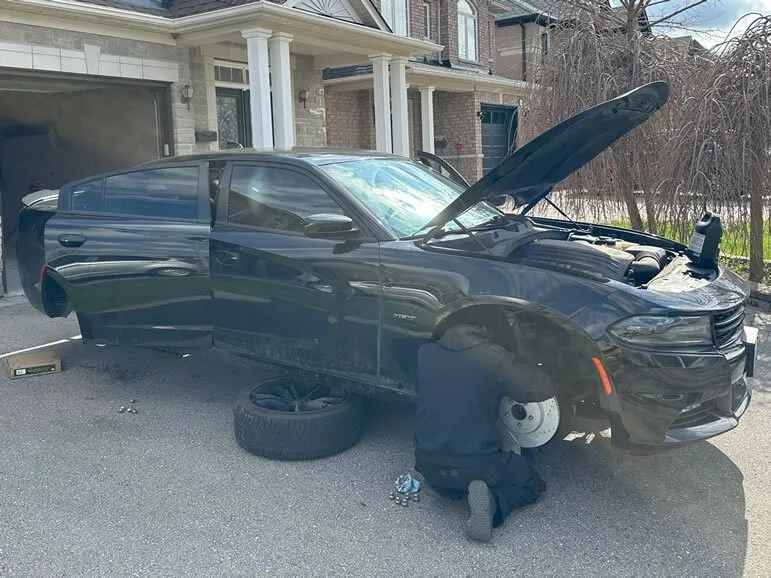Why Mobile Mechanics Need a License to Change Brakes in Ontario
June 15, 2025What Ontario Law Says About Brake Work

In Ontario, brake system repair falls under the Alignment and Brakes Technician trade—a compulsory certification. This means any individual performing brake diagnosis, repair, or replacement for compensation must hold a valid certificate from Skilled Trades Ontario.
The required apprenticeship typically includes 5,880 hours of training (5,400 hours on the job and 480 hours in-class) over three to four years. A mechanic without this certification performing brake work is in violation of provincial law and may face penalties, including fines of up to $5,000 for a first offence and $10,000 or more for subsequent violations.
Common Automotive Licenses in Ontario
The following table outlines the most relevant trade licenses in Ontario’s auto repair sector, including the one required for brake work.
| Trade / License | Scope | Apprenticeship Duration | Compulsory |
|---|---|---|---|
| Alignment & Brakes Technician | Brake systems, steering, alignment, suspension | 5,880 hours | |
| Automotive Service Technician | Engine, drivetrain, brakes, electrical, HVAC | 7,220 hours | |
| Transmission Technician | Manual/automatic transmissions, differentials | Approx. 7,000 hours | |
| Truck & Coach Technician | Heavy trucks, buses, trailers (Class A vehicles) | 7,000+ hours |
Which Jobs Don’t Require a License?
Some basic vehicle maintenance tasks in Ontario can be legally performed by individuals without a trade license, such as:
- Oil changes
- Bulb and fuse replacement
- Cabin and air filter replacement
- Tire swaps (as long as no brake or suspension work is involved)
- Fluid top-ups
Once work involves brakes, suspension, or steering, a license is legally required.
What Does a License Guarantee?
For clients, a mechanic's license isn’t just a credential—it’s a protection. Here’s what it assures:
- Competence: A certified mechanic has formal training, including best practices for brake component replacement, system bleeding, torque specs, and diagnostics.
- Safety: Properly repaired brakes can reduce stopping distances by up to 30%. Incorrect installations increase accident risk and legal liability.
- Consumer protection: Licensed mechanics are subject to Ontario’s Consumer Protection Act, which mandates itemized invoices, warranties, and clear quotes.
- Accountability: Clients can verify licenses and file complaints with regulatory bodies if there’s malpractice.
Why Hiring a Licensed Mobile Mechanic Matters
With mobile repair becoming more popular, many people skip checking credentials. But here’s why you shouldn’t:
- Licensed mechanics can be verified publicly through Skilled Trades Ontario.
- They follow workplace safety and environmental standards.
- They provide receipts, quotes, and warranty-backed work.
- They carry insurance—protecting both you and them in case something goes wrong.
Are Truck Mechanics Licensed Differently?
Yes. Mechanics who service heavy trucks, buses, or motor coaches must be certified as a Truck and Coach Technician. This license is mandatory for working on Class A commercial vehicles.
These vehicles often use systems such as air brakes, hydraulic lifts, or engine retarders that require specialized knowledge beyond what’s taught in light-vehicle trade programs.
The same goes for transit vehicles, dump trucks, and delivery fleets—all require certified heavy-vehicle technicians for anything beyond minor maintenance.
License Requirements by Task and Vehicle Type
| Task | Requires License | Trade Classification |
|---|---|---|
| Brake pad or rotor replacement | Alignment & Brakes Technician | |
| Brake fluid bleeding | Alignment & Brakes Technician | |
| Oil/filter change | Not licensed | |
| Tire swap only (no alignment or brake check) | Not licensed | |
| Suspension work | Alignment & Brakes Technician | |
| Engine/transmission repairs | Automotive Service Technician | |
| Commercial truck brake work | Truck & Coach Technician |


